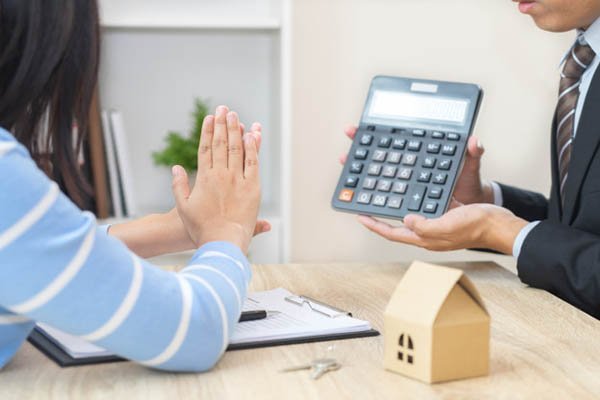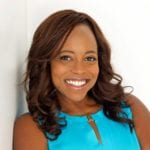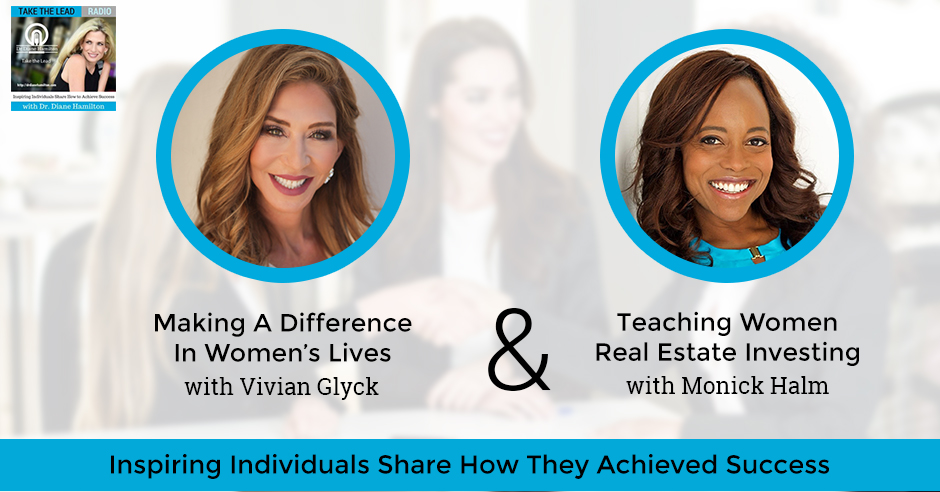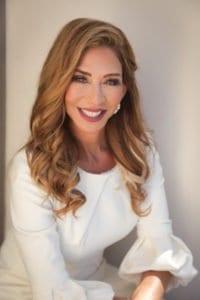We have Vivian Glyck and Monick Halm here. Vivian is the Founder of JustLikeMyChild.org. You’ve probably seen the work that they do in Africa. It’s amazing stuff that she’s doing. She has a foundation for empowering women and girls to achieve their full potential. Monick Halm is the Founder of Real Estate Investor Goddesses and the Principal at Vineyard Investment Partners. It’s going to be fun to talk about some of the things she’s doing to teach people how to be real estate investors. She’s got a law degree and very interesting background behind what led to this. I’m very interested in talking to these very successful women.
Listen to the podcast here
Making A Difference In Women’s Lives with Vivian Glyck
I am here with Vivian Glyck, Founder of Just Like My Child Foundation. In 2006, she followed the birth of her child, Zak, with creating this foundation and it was based on a mother’s love for her child. She woke up and realized that there was a value for every human life. After learning about the horrific numbers of children dying from malaria and orphaned by the AIDS epidemic in Africa, she was moved to make a difference. She has a great story and I am glad to have her on the show. Welcome, Vivian.
Thank you so much. This is great.
I’ve had a lot of different focuses on this show and yours is a fascinating story because I saw your background. I read about what led to you creating Just Like My Child and I was hoping you can share a little bit about growing up in Spanish Harlem and what led to you thinking that this was an important foundation for you.
As you mentioned, I was born and raised in New York City in Spanish Harlem. Both my parents are Holocaust survivors and we grew up under the poverty line my entire childhood. When I was living with both of my parents, there was definitely a lot of abuse going on in my home, both domestic violence and sexual abuse with me. When I had the opportunity to get some mentorship and get some support and be able to find my own voice, I was able to transcend that impression on my entire being. I was able to move on from there. When I started Just Like My Child, this was many years after that and it was after the birth of my own son, what I got to see was the incredible value of one human life through him.
I had the opportunity to start learning about the issues that were going on in Africa and in Uganda and couldn’t understand how it was that my son got to have all of this incredible medical care access to education, empowerment, and etc. Children’s lives around the world are being snuffed out on a daily basis with nobody paying attention. These two things of my childhood and being able to see the world anew through having a human that I had to take care of created a huge desire in me to see what I could do to make a difference.
We worked in Uganda and East Africa with adolescent girls, but when we started working in health care, in maternal health, and trying to stem the maternal mortality, the death of mothers in childbirth and to stem that orphan population because everybody was all concerned about the orphans. I’m like, “Why do we have so many orphans?” We started doing maternal health, microenterprise, building schools. We invested in infrastructure and started to see that nothing was going to make a difference until we intervened in the lives of adolescent girls to where we work. Nearly 50% of girls drop out of school before they reach even junior high school. They’re forced into child marriage. Almost 80% of girls have had at least one child by the time that they’re eighteen years old.
What we saw was that women and girls can and must be the solution, but when you take away their voice, their power, and their financial independence, they just become part of the problem. To bring it around, going back into my own adolescence and looking at the value of finding my own voice and who I could become because of that and then projecting that onto what these girls were going through, we realized that was where we wanted to focus.
Just Like My Child Foundation has implemented a program we call the Girl Power Project. We’re committed to reaching 20,000 girls by 2021 with a program that is focused on keeping them in school, avoiding forced child marriage, early pregnancy, rape, disease, and allowing them to live the life of their dreams so that they can be the solution that their country needs instead of us continuously giving a hand out. That is encapsulated.
Your story is an amazing one. I have had Roya Mahboob on my show. She was Time Magazine’s Most Influential People of the World. She created a program for young women in Afghanistan to help them use technology to get virtual jobs. I worked with her on a program for the young girls to develop certain skills. I’m interested in developing my works more with curiosity and developing skills to help in organizations and personality type things. I also think that what people like Roya and what you do is getting to people at such a young age, which is so important. There are so many people who don’t even look outside their own neighborhoods. You’re going to Africa, which I know I’ve had other people on my show that deal with Africa. I’m curious why Africa? What made you gravitate towards there?
I feel as though the answer to that is for me a little bit comic. I don’t know 100% know why I was there, but it was a profound calling. At the end of the day, it is so inexpensive to make tremendous strides there. It costs us $100 to put a girl through two years of empowerment training. For us to even get a conversation started with the school system in the United States would cost us a couple million dollars. When we were putting up schools, it was $25,000 to put up a six-room schoolhouse. It is very inexpensive to make radical changes there.
I believe that the issues that we feel about terrorism around the planet and the radicalization of young boys and men are all because women don’t have a voice. Whatever happens over there happens over here. I don’t believe at all in this separation of boundaries that we can keep ourselves safe by closing our boundaries because it all comes back to us. If there’s peace on the planet, there’s peace at home. Africa is ripe for radicalization. It’s happening every single minute. A woman and an empowered girl is the first line of defense against that. To me, I did it for us.

Empowering Women: If there’s peace on the planet, there’s peace at home.
That’s important that you note how much you can get for so little in these other countries. It’s hard to even almost fathom. I don’t know if you saw the movie The Heart of Nuba, but a friend of mine produced that and it was about a doctor who treats patients in the Nuba Mountains in Sudan. It’s a great movie. You might enjoy watching what he’s done. He got there and he felt compelled to stay there and help these people. What you’re doing reminds me of that. I saw what you said about every girl in the group when you asked if they’d had sexual abuse, every girl out of nineteen girls that you were speaking to all raised their hands. That’s devastating to hear. Were you surprised by the numbers? Is educating about that helps? How do you stop the abuse?
A lot of it is knowledge and information and it’s also educating the community. A big part of what we do is educating the community. When we think about the things that, “We can’t change.” We can. If you think about like how smoking was in the US 30 years ago, it’s a huge transformation. I think about the times that when I was growing up, the police would come to my door where I was being raised because they were called because of noise and disruption. My father would tell them “Everything’s fine, go away.” That wouldn’t happen today. That’s a shift in education, that’s a shift in empowerment.
If I beat my son, he would call Child Protective Services. It’s giving girls the information and the knowledge that they are entitled to protect themselves, that their body belongs to them, that they do not need to be submissive because that’s what the culture requires of them, is to be submissive. They have rights to go to school to prosecute abuse, to be protected from it. At the same time, we’re teaching them about their bodies, their reproductive health, puberty, self-defense, and financial literacy. How to build their own businesses and we’re also teaching the community. It’s not an isolation.
Those police officers who would come to my door have been educated by the community by the level of knowledge in our country to know that you don’t just go away when the dominating man comes to the door and says, “Go away.” When you incorporate the community and the parents and the teachers and they understand what their rights are, then they can understand that their children are entitled to those rights also because it’s multi-generational.
[bctt tweet=”It is go time for feminine energy on the planet.” via=”no”]You’ve been recognized so much for what you’ve done. I’m looking at the names of people who have had you on their shows. I know you’re a marketing director for Deepak Chopra and Tony Robbins and all these others. I’m looking at your background of the influence you’ve had. It reminds me a little bit of Gerald Chertavian’s Year Up when they go to people here in the United States and they help them in the poorer areas to get them ready and prepared for education and work. At what point do they take going on their own, that they’re not part of your foundation anymore? Are they a lifetime thing involved with you? How does that work?
First of all, all of our trainers and facilitators are Ugandan. We have a Boy’s Empowerment Program as well. Men and women teach them. It’s a two-year program just like in our schools. An outside organization might come in to teach about bullying or about self-defense or about social media. We are coming in and giving two years. It’s not full-time at 60 hours information. Then we’ve been able to prove considerably shifts attitudes and beliefs within the community and within the girls and the boys over that period of time. We’ve been able to scientifically and statistically prove the efficacy of the girl power project then we’ve given these kids information and knowledge to move forward with in life. We’re also conducting a longitudinal study on a smaller cohort of girls to see what the long-term effects of this are. Nothing that we do is about a handout. It’s all about providing expertise, knowledge, and education that nobody can take away from them.
There’s so much of, “Give them a fish versus teaching them to fish,” in that. What interest me is how you had this background and yet you were able to break away and change the pattern. I’m curious what you think made you be able to do that where these girls or have you mentoring them are boys. They have that as the thing to show them something else exists than what they had. How did you determine that on your own when you were young? How were you able to change that?
It’s the same thing. It was just having a mentor, having somebody who was able to point out that I did not have to be the victim of my circumstance. I had a voice, that I could say no, that I could get protection. That was a real turning point for me. I didn’t realize it until many years later how pivotal that was. It did dictate the rest of my life.
[bctt tweet=”We all have a unique set of gifts and experiences that inform our lives and how we decide.” via=”no”]Did you have siblings or were you an only child?
I have two older brothers. When the proverbial crap hit the fan in my house, my brothers were both out of the house. My mother and I were even more vulnerable. That was pivotal. We’re all such complex beings. Having had my parents survived the Holocaust and understanding what happened when people turn their back on the suffering of an entire group of people, what happened, how the planet suffers as a result as well, it imbued me with a certain amount of consciousness and compassion for the suffering of others. That went hand-in-hand. We all have a unique set of gifts and experiences that inform our lives and how we decide. For sure when I had my son, you hear about it, but they just can’t get it until you experience what an unbelievable gift it is to be able to care for another human and to have that and to know how tentative that can be. A baby could die in front of your eyes without your attention. Yet at the end of the day, God has it rigged so we all do survive one way or another.
I’m curious though, your parents, did they get to see you create this foundation and how do they feel about you telling your story of abuse?
My father died in 1981. I’ve been released from that concern. I worked on it quite a bit with my mother. It’s my story just like all of these stories out there. It’s our story and nobody can tell us what we can or can’t be saying about it. I know the veracity of it because I lived it and nobody else in my family did. I’m feeling in some ways it’s liberating to my mother and my brothers to not have it contained. I don’t ever feel like I’m a victim or I need to tell anything about it in order to have people feel sorry for me at all. I feel as though it’s more of an opening for other people, especially women. I know for sure when I am telling that story in front of a group of women, I got a group of women who were nodding in agreement. It’s powerful.

Empowering Women: All of these stories out there are our story, and nobody can tell us what we can or can’t be saying about it.
You were honored with the Woman of Peace Award. You’ve gotten quite a lot of recognition for this and I know you do these events. You do different things based on what you’re working on. Do you have any events coming up or anything you want to talk about that you’re working on?
For many years, we had galas, big events. We moved them to Hollywood in LA and they’ve been extraordinary. Last year, Viola Davis was our global humanitarian recipient. The year before, it was Jada Pinkett-Smith. We had this wonderful series of events, but this year, we decided that given what was going on, the energy on the planet, the feminine rising that we wanted to create something different. We’ve thrown out the gala model, we’re not gala-ing, we’re gathering. Just Like My Child Foundation has created a thing that we’re calling The League of Extraordinary Women. We’re inviting women to join us in coming together in gatherings as opposed to galas.
Once you become a league member, you are invited to come to up to four events a year and we’re having a big summit gathering, which we’re super excited about. Sheri Salata, who is Oprah Winfrey’s former executive producer, has agreed to be our mistress of ceremonies. We know it’s going to be a great event. Lisa Nichols, who was the star of The Secret, is an incredible mobilizing speaker and is going to keynote for us. Dan Buettner of Blue Zones Information and Knowledge Research is going to speak to us as well. JJ Virgin, who’s the celebrity fitness and nutrition expert and many other women are coming together in a day-long where we’re offering to women here what we offer to girls in Uganda, which has the power to build up our own inner resources or self-esteem, the knowledge and understanding of how important collective community is, the summoning of the sisterhood.
It’s how women engaged their power is through network and community. Also, offer women the opportunity to step into their own action. It is go time for feminine energy on the planet. The gatherings and the league are our way of answering that call. It also helps us to raise the funds for the work that we’re doing in Uganda. You can find out more about all of this at JustLikeMyChild.org.
[bctt tweet=”What an unbelievable gift it is to be able to care for another human.” via=”no”]That’s awesome that you guys are doing such amazing work. I’m always impressed with people who do the things that you do. I’ve had other guests that are doing these amazing things that take so much of your life force. This is a major project that you work on and I can’t even imagine the travel and being there. The emotions involved and all the things you do is amazing. I wanted to thank you for being on my show to share your story.
This is lovely. Thank you for letting me just riff here.
Teaching Women Real Estate Investing with Monick Halm
I am here with Monick Halm, who is the Founder of Real Estate Investor Goddesses and Principal at Vineyard Investment Partners. She’s a real estate investor, syndicator, and developer with more than thirteen years of residential real estate investing experience. Welcome to the show, Monick.
Thank you for having me, Diane.
I don’t get to talk real estate that often on this show. I have a real estate license. I wasn’t lending for a while. I like the whole market, it’s an interesting thing to discuss. I’ve written a course for universities about real estate. It’s challenging for people to know some of the things you do because you own more than 1,200 rental units across six states. A lot of people might want to do that thing and get into that business instead of starting their own business, maybe own rentals. How did you get started in real estate investing?
I got started a little bit by accident, so I never set out to be in real estate. Growing up, I have wonderful parents who were always very supportive. They are first generation Americans. They’re from Haiti, and they told me, “You can be anything you want as long as you’re a doctor, lawyer, professor, or engineer.” Being a dutiful girl, I was a pretty good student and I ended up in law. I was a lawyer working in the large law firm in Los Angeles. I was miserable, but that’s a whole other conversation. The only thing I’d ever been taught about real estate was to buy your own home. I went to look for a house to purchase. This was 2005 so it’s the top of the last level. Even though I had a six-figure salary, I couldn’t find anything that I could afford in a slightly decent neighborhood. It was frustrating.
I had a friend who was in a similar position and he said, “Instead of each of us buying a home, why don’t we buy a duplex? You live on one side. I’m on the other side.” I went, “I can afford half a house, so let’s do that.” We went to look for one, but we ended up finding a property where one part of the house was much bigger and nicer than the other. We ended up each taking a bedroom in that one and renting out the other unit. Plus, there was a converted garage we were able to rent out and all of a sudden, we were landlords. I realized, “These people are paying my mortgage. This is awesome. I’m paying less with taxes. This is great.” I never thought about real estate, but then I happened to fall into it.
When I met my husband, he had a duplex and then we got a single family rental. After the market crashed, we sold one of the duplexes and we ended flipping because I’ve seen those HDTV shows and I thought, “That looks fun. Let’s do that.” We started doing that when houses were on sale in 2010, but they stopped being quite the one sale, especially in Los Angeles. The prices were getting higher and higher and the margins are getting slimmer and slimmer. The thing about flipping is that you get a house and hopefully you’ll make some money at the end, but then you have to start all over again. It’s not something that you can continue to cashflow on.

Empowering Women: The thing about flipping a house is that it’s not something you can continue to cash flow on.
We decided that we want to look for a property that we could buy and hold onto and put in a tenant, just continue to cashflow. Los Angeles at that time is so expensive. We were looking for a fourplex so we couldn’t find anything that made any financial sense. Then the universe, God, put the right person in my path at that time. A ten-minute conversation with him totally changed my life and set me on this path to go from the units we were holding at the time to over a thousand units in less than one year. I had this conversation with him. His name is Robert Helms. He’s the host of The Real Estate Guys Radio Podcast. He introduced me to a mutual friend. He’s done hundreds of millions of dollars’ worth of real estate investing and his career and our mutual friends said, “You should talk to him. He probably has some ideas for you.”
I met with him. He happened to be in LA that day. He was asking what I’ve been up to. I told him we’re flipping and looking for a fourplex. He said two things that completely shifted my paradigm. One was, “LA is a tough market. I always say live where you want to live and invest where the numbers make sense.” I went, “It’s obvious in hindsight, but I’d never thought of that.” I always thought I had to invest where I could drive to the property, touch it, feel it, and manage it myself. The other thing he said was, “You could bet that fourplex, which is limited to your own capital and credit that alternatively, you could bring a group of investors together and instead buy a 100 or 200-unit apartment building.”
Then he started telling me about the benefits of that and the leverage and spreading the risk and all the win-win opportunities in that. I went, “You could do that?” I said, “How do you learn how to do that?” He teaches that. He has this syndication seminar, The Real Estate Guys Secret of Successful Syndication. I went home that night and told my husband we’re going to learn how to do this thing. We signed up, it was in Phoenix. Then by the end of that year, by bringing groups of investors together and partnering with others, we had over a thousand units.
All that you’re mentioning reminded me of an article I saw in the Wall Street Journal. I don’t know if you saw it about a guy, Martin K, who wrote an algorithm of how to pick the best real estate choices. It’s an artificial intelligence. It starts to figure out more than how MLS works where you put in one or three bedrooms, two baths. It’s almost like swipe right and left where how people date. It sounded in my mind, they get used to knowing you only houses that are near the main street. It starts to figure out the things you keep swiping the wrong direction on. That could have a lot of influence.
[bctt tweet=”A lot of people don’t do real estate investing because they get intimidated by it.” via=”no”]I asked him to be on the show and I’d be interested to talk to him about it. It’s challenging to find the perfect investment property. There’s a lot that could be put through computers to figure out ways to make it a little easier to find things. A lot of people don’t do it because they get intimidated by it. It’s interesting that you’re focusing on helping women because there aren’t a lot of women investing in real estate. Is that what made you start Real Estate Investor Goddesses? Tell me a little about that.
One of the instructors kept saying, “Build your brand, build your network. Think about who do you want to work with.” Between being a lawyer and being at that seminar, I had started becoming a coach. I became a coach and then I started coaching women around money. I was thinking, “I’m coaching women around money and it’s such a good way to build wealth.” I was thinking back to this seminar that I had been at. In the hotel gym on the Sunday morning on the elliptical, I realized that it, all of a sudden, Real Estate Investor Goddesses was downloaded to me as this group. As I’ve been in the conference, I realized there were about 120 of us there, maybe nine were women. There were so few women in the room.
There’s a lot of women real estate agents.
A lot of women that are on the vending side that support investors, but very few that are investing and that are owning. I believe with the right education anyone could get into and it makes its way 90% plus of millionaires get to be so this country. It’s a great way to build wealth. You can go build a legacy, you have a lot of time freedom. It’s perfect for a woman, especially if she’s a mom. If she wants to be able to have time with her kids, your money is working for you and you’re not doing the work for your money. When you’re investing in real estate, you’re not trading your time for money if the money goes off and it’s working for you.
I thought, “This is so perfect for women, but no women are here. No one was speaking to women about this being an option for them, about how they could do it. Also, how they could do it in a way that’s feminine and honors who we are.” It’s much of a masculine world, it can feel like you’re in the middle of the old boy’s network. I wanted to create a group where we could be a sassy sister’s network where we could learn and support one another, partner together, and work together to lift all of us up. I also truly believe that if women have more money than time, they give back. They give back to their family and they give back to our communities. They get back to the world. The world needs us to be able to give our gifts.
A lot of women who I meet tend to worry about the risk. Some of the risks, there are interesting things about real estate, just from my perspective. If you want to buy a non-owner occupied, which my husband refers to as an NOO because when I would do my training, when I was learning all this stuff, I made him do flashcards. He remembers the NOO as non-owner occupied, which means you’re going to use it as a rental property, you’re not living in it. There are certain neighborhoods that require a certain percentage. They can’t be more than a certain number of houses in the neighborhood that are non-owner occupied.
[bctt tweet=”Freedom is perfect for a woman.” via=”no”]There’s a lot of different things that people don’t know about. It gets confusing. There are all these exchange rules if you don’t want to pay taxes, and so you have this legal background that some states require lawyers to look at contracts with Arizona. Real estate agents do their own. Do you think that it’s the legal aspects? Do you think it’s the risk aspects that make people hesitant? I’m curious what you think are the harder things for people.
There are three main reasons why people, in general, get nervous about investing in real estate or they’re not investing in real estate. The first reason why they’re not investing in real estate is that they don’t know it’s an option for them. I accidentally happened to fall into it. I don’t think I’m stupid, I was in an Ivy League school. I was fairly sophisticated. I had no idea that this was a possibility for me. It wasn’t even anything I could conceive of. Even on the smaller scale, I never thought of it. A lot of people are in it because they don’t see it as something that is an option for them or possibility for them. When they are educated to all of the various possibilities because there are so many different ways of investing in real estate, it could be like I did where it’s owner-occupied, maybe your first investment, you live in one side and then you’re able to rent out another unit or two or three units. You’re able to get into a property where you’re living, but your tenants are paying the expenses and then stop.
That’s one way. They can go from there all the way to the larger project type projects that I do. Not knowing that it’s a possibility, not realizing all the different options from our tax liens. There are a lot of different ways of investing. The second thing is maybe they may know that it’s an option, but then they don’t know the steps they have to take. They’re like, “It’d be nice if I could own some rental property, but I don’t know what I’m supposed to do in order to get there.” It’s true if you don’t have an education piece, then if it’s hard. It’s easy to make mistake and it’s also easy to spot the opportunities that are out there for you.

Empowering Women: If you don’t have the education, then it’s easy to make mistake.
The third thing is maybe they know what’s possible and they know what the steps are, but then they’re afraid of making a mistake and losing their money. The antidote to that is to have the right support network and that the right people around you that are doing it successfully are saying, “I’ve done this. You can do this, too.” You’re surrounded by good people with good hearts that can mentor you, that can cheerlead for you, that can support you. When that’s in place, then people are willing to take steps and take action and get into the game.
You bring up some important things. For me, once I found the joy of having a property manager dealing for stuff I didn’t necessarily want to deal with, that was a huge factor because you’re thinking they’re going to call you in the middle of the night. You’re thinking all these things that won’t happen if you have a property manager. For me, also, I had a real estate license, I don’t know what you recommend for people in terms of that, but I’d like to hear your opinion on that. Also, I thought it was important to have an LLC for every property I purchased just for liability reasons. What do you think of those? Do you give different advice?
With regards to having a property management, yes, if you can do it. One of the paradoxes is buying larger property. It seems like it’s so much harder and much bigger hurdle. It’s easier. You’re more likely to be able to afford third-party property management. Like all of the properties that I own, with the exception of my duplex in LA that I still have here, I’ve never dealt with the three Ts, toilets, tenants, termites. I don’t deal with it because I have third party property managers and they deal with it. I have to manage the managers, the managers are managing the assets, but I’m not doing any of it. I don’t have the keys. I don’t know who the tenants are. I don’t have to lease to them.
That is a wonderful way to invest and it makes it way more passive. You talked about meeting a broker’s license or being an agent. I am neither. I’m not an agent. I’m not a broker. I’m an investor. I have brokers, I have agents. I have a great team. Real estate is a team sport, so you need a wonderful team. You want to have a wonderful broker and agent, but you don’t need to be one in order to be successful. You just need to have one. I’m okay with not doing it. I’m not trying to save a few percentage points. I’d rather somebody who’s really good at what they’re doing, and that’s what they do all day. I’m happy to give them their commission so they can go off and find the properties, and I don’t have to do that.
I’m totally cool with that. It’s a different job and I don’t want that job. I’m happy not doing it. The third point is buying in an LLC. That is about asset preservation and it’s risk mitigation. We, unfortunately, live in a very litigious society and things can happen. I got sued because I had a dog. It was Halloween. I was crossing the street and my dog was little, eleven-pound thing, but bit a woman on the knee. I think you could have put a Band-Aid on it and that would have been fine. I gave her my card saying, “If you go to the doctor and have any medical expenses, please call me. I’ll happily pay for them.” She has all the shots. The next thing I know I get a letter from a lawyer and I ended up getting sued for one point $1.2 million because of the emotional pain that it caused her, her husband, and her two children that had to see this vicious dog bite her.
That must have made you hesitant and worried that this could happen, but it sounds like you solve that. Did you win that one?
My insurance company took care of it. They settled. The point is people sue over anything here in this country. Every property we have, we have it separate, especially since we have investors. I can’t have my investors lose money because a dog bit somebody or there’s a slip and fall in another property. Every property is segregated and it’s protected. That’s something that you would want to talk to an attorney. Part of your team should be an attorney and a CPA.
[bctt tweet=”When women have more money than time, they give back.” via=”no”]If you have 1,200 rental units, does that mean you have $1,200?
I have 1,200 doors in eight properties.
Every time I open an LLC they require a separate checking account and all that stuff. That’s the only thing I find a little bit of a pain.
They’re all like their own business.
You talked about the not having a real estate license and it only comes into play cost-wise when you sell. If you’re flipping a lot, that’s one thing if you’re going to hold onto investments, the buyers don’t pay the real estate fee for the real estate agents. You only deal with it when you sell. That’s another factor if you’re thinking if you need a real estate license or not. If you’re thinking of buying, selling, buying, selling in 6% in each state that you’re having to come up with when you sell is too much. Sometimes it’s worth it to get a real estate license if you like that stuff. I’m like you, it’s not my favorite. I keep mine active and every couple of years, you have to go through so much to keep it active. I know there’s a lot of people who don’t want to do that. What you’re doing is interesting. I noticed you’re also a Feng Shui expert. I know what that is, but give me little Feng Shui tips.
I am trained as an attorney and I’m a real estate investor, but then I’m also woo-woo. I have my masters and I’m a certified yoga teacher. Feng Shui is something that I’m fascinated by and I studied a lot and over and have taught it over the years. I’ll give you a couple tips that will work with almost any property. Feng Shui is an ancient Chinese practice of looking at the energy of space and how to optimize the energy in the flow. People are familiar with acupuncture and the Chi and the body. This is like fixing the Chi in a space, fixing the energy so that it flows optimally and when you have optimal flow in the space, it creates optimal results in your life. Usually, if there’s an issue in an area of your life, whether that’s the relationship or money or your reputation, or anything, a Feng Shui expert can go in even without you telling them could say, “How’s your love life going?

Empowering Women: When you have optimal flow in the space, it creates optimal results in your life.
There are some certain things about the arrangement, but I’ll tell you some universal principles that will always help. One thing is you want to fix leaks. Leaks in your property tend to be leaks in your finances. It literally costs you money if your water is running and running, but it also will result in other financial issues. You want to fix leaks, you want to have your doors and windows working. If your doors are stuck and then they don’t open well, and that might be because they’re the actual mechanism, but it also could be because you have furniture in the way or things in the way, so they don’t open doors to open at least 90 degrees, especially your front door, the main door to the home.
When those aren’t working well, then the Chi can’t enter and flow like it needs to. You want to fix stuck windows, doors that caused stuck energy that causes you to feel stuck in your life. Clutter is also stuck energy. If you have a lot of clutter or cluttered areas in your house, then you’ll find that you’re feeling stuck. Where the clutter will relate to a particular area of your life and that will also cause you to feel stuck. Fix your doors and windows, and keep things clean, uncluttered, and not leaking. That would be a wonderful way to fix through Feng Shui and it applies to pretty much everybody.
I know you write about a lot of things and that’s why I brought that up. I know you write for Huffington Post and a couple other places. I thought that it would be great if people could find your information. Do you mind sharing, how can people find you and learn more about what you’re doing?
The best way to find me is to go to RealEstateInvestorGoddesses.com. You can also find me on Facebook. We have Real Estate Investor Goddesses page there, or you can go to my personal Facebook page, Monick Halm. I’m also on Twitter, @MonickHalm and on Instagram.
Thank you so much to Vivian and Monick. We got so many great guests on the show. If you’ve missed any past episodes, you can find them at DrDianeHamiltonRadio.com. If you want to find out more about my book, you could go to CuriosityCode.com. You’ll also be able to access the Curiosity Code Instrument there, the CCI. I hope you enjoyed the show and I hope you join us for the next episode of Take the Lead Radio.
Important Links:
- JustLikeMyChild.org
- Real Estate Investor Goddesses
- Vineyard Investment Partners
- Girl Power Project
- Roya Mahboob – Previous episode
- The Real Estate Guys Radio Podcast
- The Real Estate Guys Secret Of Successful Syndication
- Facebook – Real Estate Investor Goddesses
- Facebook – Monick Halm
- Twitter – @MonickHalm
- Instagram – Monick Halm
About Vivian Glyck
Vivian Glyck is the founder of Just Like My Child Foundation that she started following the birth of her son, Zak. Having experienced the love of a mother for her child, Vivian woke up to the value of every human life. After learning about the horrific numbers of children dying from malaria and orphaned by the AIDS epidemic, Vivian realized she had to make a difference. An author and successful marketing director for Deepak Chopra, Dean Ornish, Jon Kabat-Zinn, and others, Vivian Glyck, a native New Yorker, currently lives in San Diego with her husband and son.
About Monick Halm






0 Comments